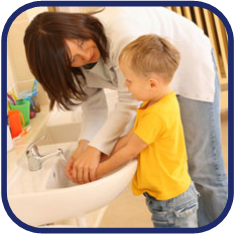News From the Registrars

The Importance of proper hand washing:
FDC 417.11(i)(2); SACC 414.11(i)(2)
Good hand washing is the first line of defense against the spread of many illnesses, from the common cold to more serious infections, such as meningitis, bronchiolitis, the flu, hepatitis A, and many types of diarrhea. Hand washing is by far the best way to keep kids from getting sick and prevent the spread of germs.
Best Way to wash Hands
- Running warm water, make sure water isn’t too hot for little hands.
- Use soap and lather up for about 20 seconds (antibacterial soap isn’t necessary - any soap will do.)
- Make sure you get in between fingers and under nails where germs like to hang out and don’t forget the wrist!
Hand washing Song for the little ones :
Tune: Where is Thumbkin?
Tops and Bottoms, Tops and Bottoms;
In between, in between;
Rub them all together, rub them all together;
Now they’re clean, now they’re clean!
Reminders:
- All programs need to have cleared egresses (ie: snow, ice etc.) FDC 417.4(h)(4); SACC 414.4(f)(2)
- Radiators are covered FDC 417.5(7)(d) SACC 414.5(d)
- Operating Carbon Monoxide detectors FDC 417.5(v) SACC 414.5(t)

Why is Active Play so Important? FDC 417.7(g) SACC 414.7(e)
Young children need regular, vigorous, physical activity – active play to develop and grow properly. Active play strengthens bones, muscles and the brain and establishes connections between all of them. Physical activity means taking part in active play and games that use the large muscles of the body. Whole body play of almost any kind, especially outdoor play, provides the movement that children need. Play that uses the hands and fingers is also important as it helps develop fine motor skills.
Active Play Ideas
Throwing a ball into a bucket and varying the distance, potato sack race, catching games, making obstacle course, parachute game, kicking and throwing a soft ball.
